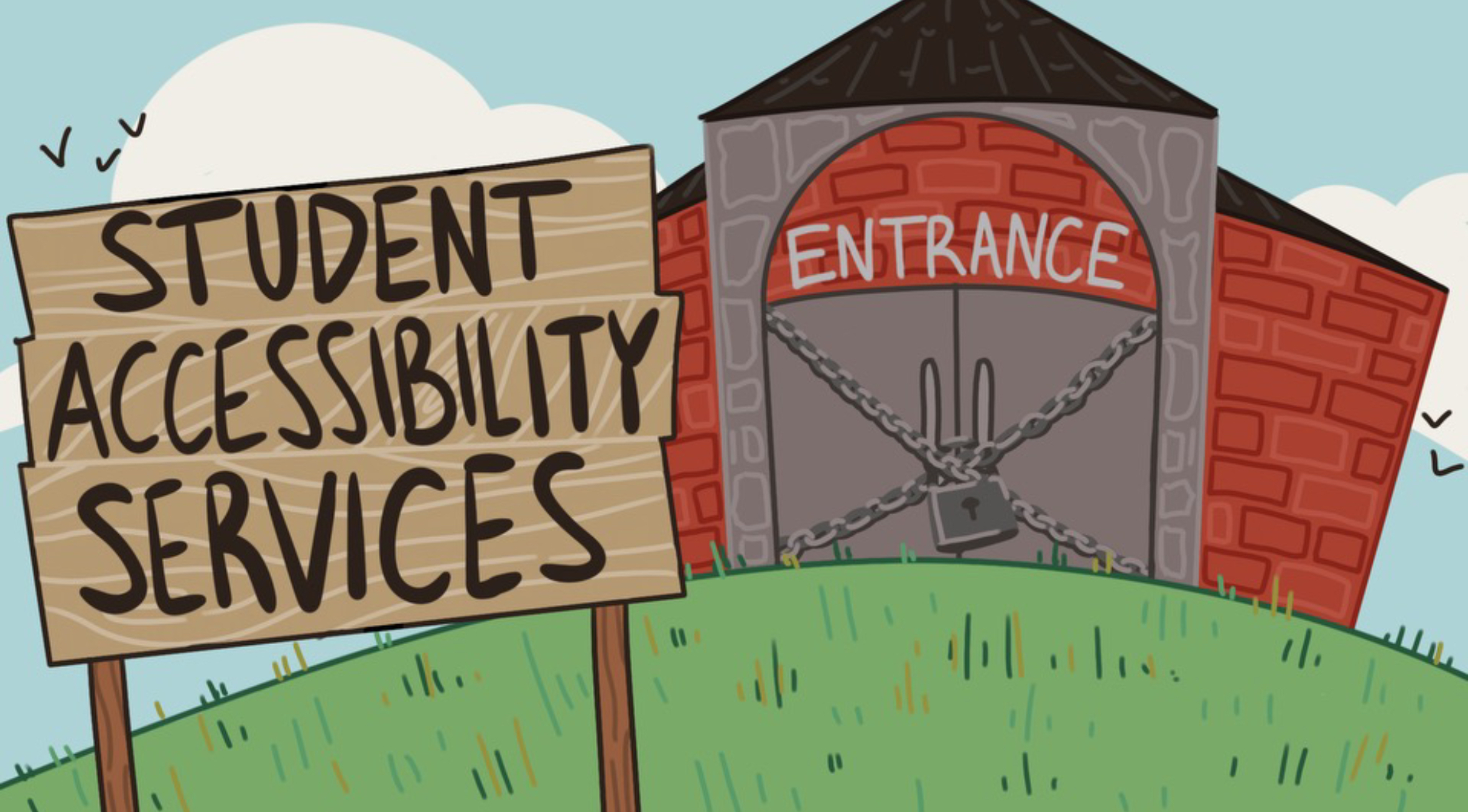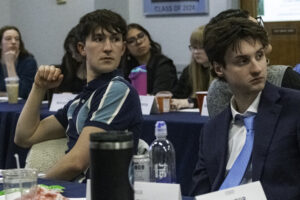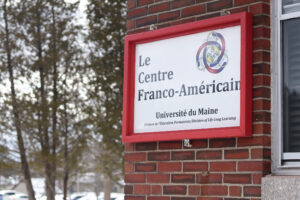In Summer 2024, history student Lincoln Tiner, a disabled veteran, was in the Memorial Union when the fire alarm rang. He recalled that every door closed and locked, leaving only the stairs as a possible exit.
“Now whenever I pass by a fire alarm, I think about when that happened and how I’d essentially be left for dead if that were a real emergency situation,” said Tiner, who is a cane and ambulatory wheelchair user.
Luckily for Tiner, with difficulty, he was able to get down using his cane. Students like him who require assistance in such situations may not have been able to exit the building, especially from a higher floor. When told to refer to the “fire plan,” Tiner found there was no suitable escape option for disabled people.
To some, the campus is a host to obstacles that make it difficult — and sometimes dangerous — to physically access facilities and resources. One example is the Student Accessibility Services (SAS) building, which sits at 139 Rangely Road, where the Bodwell Center is also located.
SAS is a department that specializes in providing accommodations for University of Maine students with physical and mental disabilities.
A welcome email from SAS Director Erica Tweedie was received by hundreds of students on Aug. 27. Instead of BCC-ing their email addresses, which include full first and last names, the sender mistakenly CCed everyone. As a result, the students were able to see every other person who received the email from SAS and who likely receive accommodations associated with a disability.
Interim Dean of Students Andrea Gifford, in a follow-up email, asked everyone to delete the original message, indicating that the information should have been kept private.
Third-year psychology student Ella Frick feels that this mistake is symbolic of a larger issue within the department and beyond it. She expressed that SAS needs to be more protective of the vulnerable population they serve. While this breach of student privacy was clearly an error, Frick worries that the university wouldn’t have her back in the event of political challenges against those with disabilities.
To Tiner, the late and brief apology indicates that the administration worries more about saving face than taking accountability. He claims that the response was only offered as a result of the press, namely News Center Maine and Bangor Daily News, catching wind of the error. He theorized that without it being reported on, the administration would have never addressed the email mishap. Gifford included in her response that UMaine emails are generally considered public record, and that SAS provides other services.
“They also provide housing accommodations as appropriate, provide the decision on emotional support animals and work with Sodexo on food-related accommodations for medical conditions or food allergies for example,” said Gifford.
The department relocated two years ago to its current spot on campus that some deem inaccessible. From the heart of campus, SAS can only be accessed by traveling on an incline. Those with physical disabilities may struggle to reach the building. From the Long Road hill, it also involves crossing the street.
Gifford referred to the space as the “most appropriate” for accommodating academic testing for students who use SAS services. She added that the building is directly on the bus route and offers excellent parking.
Tiner recalls that there was previously a van service for students with disabilities to get around, but it was discontinued. He considers SAS transportation necessary assistance that the university should have continued to provide, especially considering the harsh weather conditions in Maine.
“They said that they took it away because it was too high in demand, which I would say is the reason why you should keep having it,” said Tiner.
According to Gifford, there was actually a decrease in demand for this service, along with maintenance issues with the van and difficulty hiring drivers. She also noted that transportation offered on campus must be offered to all students, faculty and staff.
Tiner is most discontent over the fact that students with disabilities were not involved in any administrative conversations about moving to the outskirts of campus from the now-demolished East Annex, which he noted was also unideal. He claims that the relocation process was lengthy but also silent.
Frick shared a similar opinion, stating that SAS needs to receive stronger support and move to a better location. The two students expressed that funding would be better allocated toward necessary UMaine services, particularly housing, food and accessibility organizations.
“Look at the ways that we’re investing in this campus and geographically, how we’re pushing everything else off to the side to make way for that, including [pushing off] students with disabilities,” said Tiner.
Tiner recalled attending a hockey game at the Alfond Arena, which last received major seating upgrades in 2011. Upon entering, he learned the only way to the student section was up a flight of stairs. Tiner’s brother had to disassemble the wheelchair and support Tiner as he clutched the railing to get upstairs. In the end, he couldn’t enjoy the game with everyone else due to the sea of standing students blocking his view, and the fact that the restroom was back down the stairs.
Inside the Memorial Union, every bathroom door in the building requires force to open. There are no buttons for those with physical disabilities, despite the door’s weight. To access the restrooms and all other spaces without open entryways, students may need to elicit help from others. Some of the food offered in the Bears Den is difficult or impossible to reach from a wheelchair.
For Frick, the accessibility feature most in need of upgrades is the elevators, particularly in dormitories. There have been several instances of elevators breaking down with students inside, as reported in the Maine Campus Police Beat.
“Every time I go into an elevator, it feels like I’m never gonna get out of this elevator again,” said Frick.
The process of receiving SAS services is through the Accommodate forum. Students who submit proof of their disability and outline the necessary accommodations will receive help. SAS also provides a list of what services they can offer. However, problems can arise after SAS passes accommodations on to instructors.
“The biggest issue I’ve had is that some professors do not read the letters. It should be between SAS and the professors to have this conversation. Legally, it’s not an obligation of the students,” said Tiner.
Frick feels that those with learning disabilities, like ADHD, are often not able to reach their highest potential due to teachers who refuse to accommodate their academic needs. But, she added, those needs being met often leads to success.
“It helps disabled students do their best in school. It shows that this school is not committed to a one-size-fits-all sort of academic method,” said Frick. “It shows that they’re listening to us.”
Lily Bailey is a third-year community leadership and philosophy student with physical disabilities at St. Joseph’s College of Maine. She formed an advocacy group two years ago called Disability Awareness Club. Their efforts have sparked several changes at the Catholic college run by Sisters of Mercy.
Bailey noted that inclusion was already a core community value, which made the school especially willing to advance its accommodations. She’s noticed significant improvement in the last two years and specified that there has been a notable interest in progression since her first day of classes.
“The president of the college came up to me and gave me his card. He told me to meet with him in a few weeks with a list of things they needed to change. I got that same reaction from the facilities manager,” said Bailey.
Before committing to St. Joseph’s, Bailey took a tour of UMaine. She shared that the tour group continued on without her several times because she needed to find different routes to avoid physical barriers. For Bailey, this deterred her from “even considering” coming to UMaine.
“The problem with accessibility at UMaine is not that they lack the structural accessibility, just that they lack the attitude to want to change it,” said Bailey.
Julia Endicott is the communications director at Disability Rights Maine, an organization which enforces rights and helps expand opportunities for people with disabilities across the state. She shared that the Americans with Disabilities Act and the Maine Human Rights Act were monumental in forming ADA regulations, which generally apply to universities.
“We provide direct client advocacy and legal representation for people in Maine who have a disability and are experiencing some sort of rights violation because of a disability, so that very much could mean not receiving appropriate accommodations in college,” said Endicott.
When a student with disabilities finds themselves being denied access to the same spaces as non-disabled students, there are steps to remedy the situation, as described by Endicott. The first would be talking to someone who can either resolve the issue themselves or help initiate the process. If this does not lead to a solution, a formal letter to the institution in question that outlines how needs are not being met is in order. The final and most extensive step would be to file a Maine human rights complaint, leading to formal litigation.
“Some issues are really quick and easy and inexpensive to resolve. Others are not. So there’s a lot of variety in the timeline of what that can look like,” said Endicott.
Tiner wants students to be involved in decisions that impact the disabled community at UMaine. This could come in the form of a questionnaire for people to directly report their concerns to SAS, or a formal position that involves regular communication with administrators on the issues most impacting students with disabilities.
Frick asks that the school organize more social events geared toward students with disabilities. The programming could help create a sense of connectedness.
“A lot of disabled students feel alienated from their peers for a lot of reasons. If we had more social events, it would help them learn that there are people like them,” said Frick.
The university has the option to hire a consultant who is trained in ADA rules. This architectural expert could outline the specific areas that need to be updated.
UMaine President Joan Ferrini-Mundy was not available for an interview with the Maine Campus regarding SAS. She instead provided a comment.
“We continue to invest in new resources and services that help remove barriers and create an inclusive learning environment. These efforts build on our broader work to advance student success, which is reflected in our retention and graduation outcomes,” said Ferrini-Mundy.







